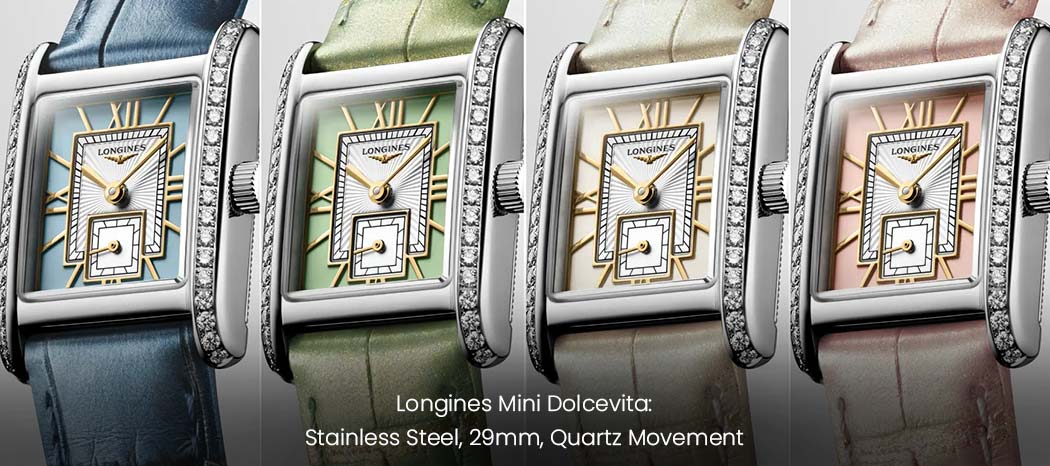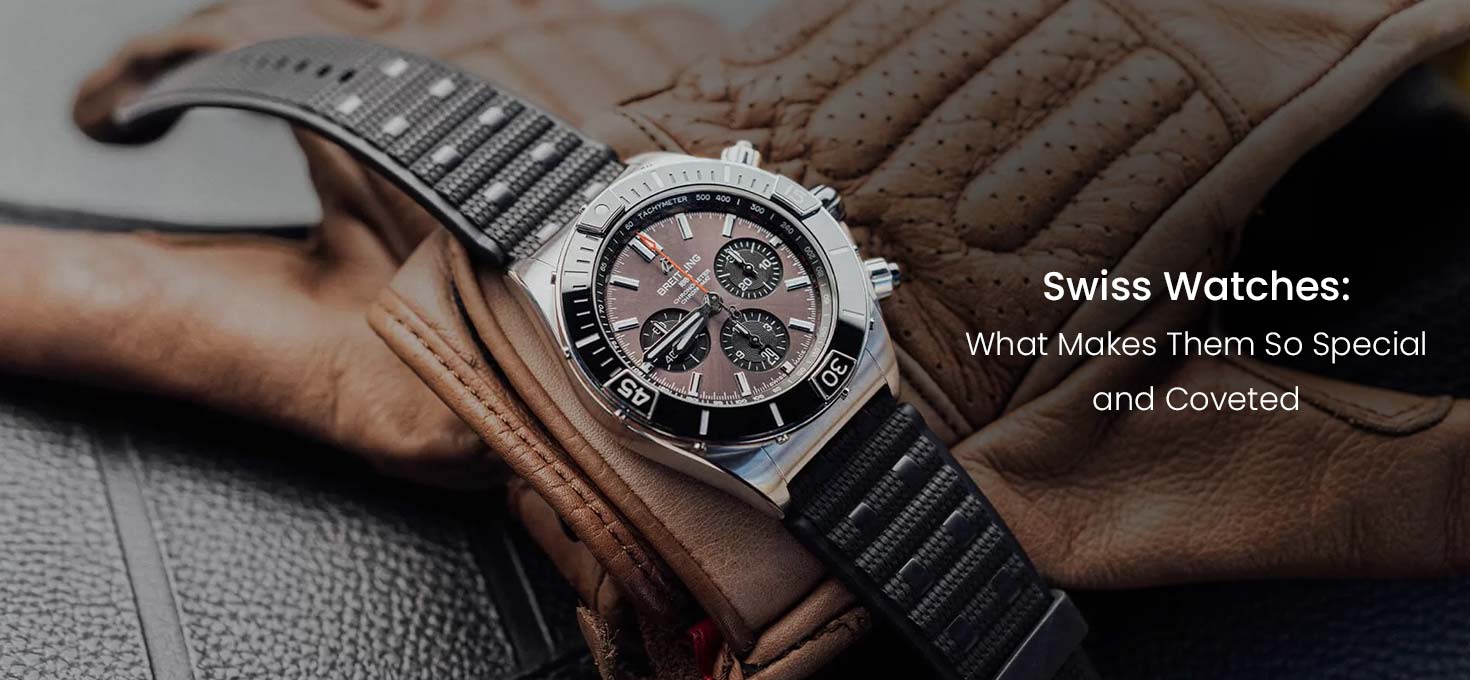Ever wondered why Swiss-made watches are so popular? Swiss watches transcend mere accessories, representing a rich heritage and an unwavering dedication to horological excellence.
Switzerland has long been hailed as the heartland of watchmaking, with the “Swiss Made” tag serving as a badge of excellence for countless prestigious watch brands. But how did this small European nation dominate the industry? The story is of chance encounters, historical quirks, and a cultural preference for understated elegance over flamboyance. Let’s explore how these factors converged to shape Switzerland’s unrivaled position in the world of watches.
A Closer Look at What Sets Swiss Watches Apart from the Norm
Swiss watches stand out from the crowd for several reasons, distinguishing themselves as timeless symbols of craftsmanship and precision. One key factor is the meticulous attention to detail inherent in Swiss watchmaking traditions. From complicated movements to impeccable finishing touches, each timepiece is crafted with precision and care, reflecting centuries of expertise passed down through generations. Additionally, Swiss watches are renowned for their durability and reliability, undergoing rigorous testing to ensure they meet the highest quality standards. Furthermore, the Swiss watch industry exhibits a culture of innovation, constantly pushing the boundaries of design and technology to create functional and aesthetically pleasing watches. These qualities make Swiss watches a coveted choice for discerning collectors and enthusiasts worldwide.
How Switzerland Came to Dominate Watchmaking: 6 Factors

Switzerland’s watchmaking industry domination affirms centuries of dedication, innovation, and precision. But how did this small European nation rise to prominence in such a competitive field? Exploring these six factors behind Switzerland’s watchmaking supremacy reveals a rich tapestry of history, culture, and ingenuity.
Origins of Timekeeping with the First Mechanical Clocks:
The journey of Swiss watchmaking began with the advent of mechanical clocks in the 13th century. Before these complicated timepieces, sundials and water clocks were the primary means of measuring time. The earliest known sundial dates back to ancient Egypt, around 1500 BCE. However, in the 13th century CE, mechanical clocks made their debut, believed to originate from the region between southern Germany and northern Italy, geographically close to Switzerland. These initial tower clocks, developed in the late 13th century, relied on heavy weights for power and signaled time through bell strikes, lacking the traditional dial and hands we are familiar with today. The cumbersome nature of these early clocks could have helped portability, delaying the miniaturization necessary for personal timekeeping devices.
Early Watchmaking Beyond Switzerland:
During the latter half of the 16th century, portable clocks gained popularity among elite circles, although they needed to be more practical. It wasn’t until 1675, with the invention of the balance-wheel-based regulating organ by Christiaan Huygens, that significant advancements were made. This breakthrough paved the way for the pocket watch, enabling further miniaturization and improved accuracy. British watchmaking also contributed substantially during this period, with innovators like Robert Hooke and Thomas Tompion refining the mechanisms crucial for timekeeping.
John Calvin’s Impact on Swiss Watchmaking:
In the early 16th century, the influential reformer John Calvin played a pivotal role in shaping Swiss society and, indirectly, its watchmaking industry. Forced to flee Paris due to his opposition to the Catholic Church, Calvin sought refuge in Geneva, Switzerland. Embracing Calvin’s teachings of austerity and modesty, French and German Protestant artisans turned to clockmaking as a practical and less extravagant craft. This influx of skilled artisans established Switzerland’s emergence as a watchmaking powerhouse.
The Reformation’s Influence on Timepieces:
The Protestant Reformation, ignited by Martin Luther’s actions in 1517, sparked widespread religious and social upheaval across Europe. French and German Protestant artisans faced persecution, prompting many to seek sanctuary in Switzerland, drawn by its reputation for neutrality and tolerance. This inflow of Protestant craftsmen, particularly clockmakers and jewelers, enriched Switzerland’s burgeoning watchmaking industry, contributing to its eventual dominance.
Calvin’s Shaping of Swiss Watchmaking:
Under Calvin’s influence, Switzerland witnessed a rapid expansion of its watchmaking sector. Adopting the values of simplicity and functionality, artisans transitioned from jewelry-making to clockmaking, capitalizing on the growing demand for practical timepieces. The concentration of diverse skills and expertise in Switzerland fostered a thriving watchmaking industry, setting the stage for its global prominence.
Serendipitous Moments in Swiss Watch History:
A series of fortuitous events and historical circumstances propelled the evolution of Swiss watchmaking. Calvin’s presence in Geneva and the influx of Protestant artisans laid the groundwork for Switzerland’s ascent as a watchmaking powerhouse. Today, Switzerland holds the highest position in the industry, manufacturing the most prestigious timepieces valued at over $1,000 while upholding its renowned reputation for precision, craftsmanship, and innovation.
Precision Comes at a Price: Exploring the Reasons Behind the Cost of Swiss Watches

Exploring the reasons behind the high cost of Swiss watches reveals a combination of factors contributing to their premium price tag.
Crafted with exceptional precision and utilizing top-quality components, Swiss-made watches are highly priced due to the meticulous artistry involved. Watchmakers invest years designing innovative movements, which are then carefully assembled by hand, ensuring unparalleled durability and accuracy.
The elaborate production process, often spanning months, results in limited availability and heightened demand, further driving up the cost. Moreover, Swiss watches are crafted from only the finest materials, guaranteeing longevity and precision while embodying a luxury image associated with prestige and exclusivity.
Given their status-symbol appeal and reputation for exceptional craftsmanship, consumers willingly pay a premium for Swiss watches, recognizing them as an investment in quality and status.
Top Tier Timepieces: The Leading Swiss Watchmakers Setting the Standard

Switzerland has long been synonymous with precision craftsmanship in watchmaking, and its top-tier timepieces continue to set the standard for opulence and superiority. Among the leading Swiss watchmakers are iconic names known for their timeless designs and impeccable accuracy, celebrated for their intricate complications and unparalleled attention to detail. Renowned for its avant-garde innovations and distinctively crafted Swiss timepieces, it stands as a beacon of Haute Horology. Meanwhile, the leading Swiss brands consistently challenge conventions with their pioneering technological advancements and remarkable artistic finesse. Rooted in centuries-old traditions yet unafraid to embrace innovation, these esteemed houses uphold Switzerland’s position at the forefront of the watchmaking industry, captivating the admiration of collectors and enthusiasts globally.
Swiss Watches of Distinction: Kapoor Watch Co.’s Impeccable Timekeeping
At Kapoor Watch Co., we proudly uphold the legacy of Swiss watchmaking excellence. With a dedication to quality and a passion for innovation, our timepieces are symbols of luxury and refinement.
Our collection of Swiss watches reflects our relentless commitment to excellence and distinction. Crafted with meticulous attention to detail by skilled artisans, each timepiece in our repertoire epitomizes refinement and precision engineering. From classic designs to innovative complications, our range offers something for every discerning taste and style.
Explore our collection to discover the exquisite details, impeccable finishes, and unmatched performance that define our luxury Swiss watch selection. Whether you seek a statement piece for special occasions or a reliable companion for everyday wear, our timepieces promise to exceed your expectations.
Take the next step towards time-honored elegance and precision. Visit Kapoor Watch Co. today and indulge in the luxury of Swiss craftsmanship.
Frequently Asked Questions
Q1: How Frequently Should I Service My Swiss Watch to Ensure Optimal Performance?
A1: Regular servicing every 2-3 years is recommended for Swiss watches to maintain accuracy and longevity, ensuring they function at their best.
Q2: What Commonly Used Materials Contribute to the Quality of Swiss Watches?
A2: Swiss watches often incorporate high-quality materials such as stainless steel, sapphire crystal, and premium leather, enhancing aesthetics and durability.
Q3: How Can I Differentiate Between the Various Swiss Watch Movements, and Does it Impact the Watch’s Performance?
A3: Swiss watches commonly feature automatic, manual, and quartz movements. While each has its characteristics, the choice generally depends on personal preference and lifestyle, with minimal impact on performance.
Q4: Can Swiss Watches Withstand Various Environmental Conditions, Including Water Exposure?
A4: Many Swiss watches, particularly those designed for sports or diving, come with water-resistant features. However, the degree of water resistance varies, and it’s essential to check the watch specifications for specific details on water resistance capabilities.
Q5: What Role Does Swiss Watch Heritage Play in the Appeal of These Timepieces?
A5: The rich heritage of Swiss watchmaking significantly contributes to the appeal of these timepieces. Brands often showcase a legacy of craftsmanship, innovation, and precision, adding cultural and historical value to Swiss watches.





Recent Posts
Recent Comments
Archives